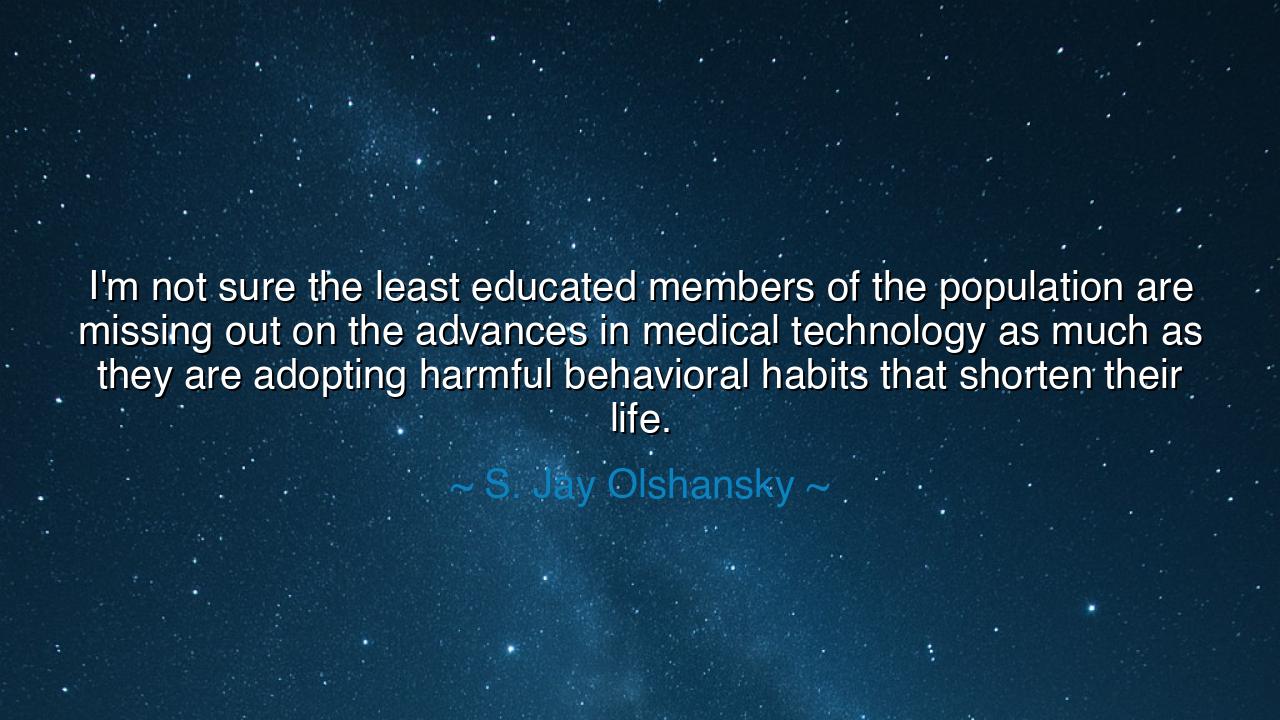
I'm not sure the least educated members of the population are
I'm not sure the least educated members of the population are missing out on the advances in medical technology as much as they are adopting harmful behavioral habits that shorten their life.






"I'm not sure the least educated members of the population are missing out on the advances in medical technology as much as they are adopting harmful behavioral habits that shorten their life." — S. Jay Olshansky
Listen, O seekers of wisdom, to the words of S. Jay Olshansky, a scholar of longevity and health, who gazes not merely upon the span of years but upon the quality of living. In this reflection, he speaks not as a judge, but as a messenger of truth — a truth both sobering and merciful. When he says that the “least educated members of the population” are not so much deprived of medical technology as they are betrayed by harmful habits, he unveils the tragedy of modern times: that the blessings of science, though abundant, are powerless against ignorance, indifference, and the choices that erode the body from within. His words echo like an ancient bell, calling humanity to awaken — to see that knowledge is health, and that the true medicine begins in the mind.
For what he speaks of is no new phenomenon. From the beginning of civilization, the sages and healers have proclaimed that wisdom and well-being walk hand in hand. The ancient physician Hippocrates taught that the greatest healer is not the doctor but discipline — the harmony of diet, rest, and virtue. Yet in our modern age, the paradox is stark: the world has never possessed greater technological miracles, yet never have so many suffered from illnesses born of their own making. Diseases of indulgence — obesity, addiction, stress, and neglect — have become the invisible plagues of the prosperous. Thus, Olshansky warns us: it is not always poverty of wealth that destroys life, but poverty of wisdom.
The meaning of his words stretches beyond the clinic into the soul of society itself. He speaks of education, not merely in books, but in awareness, the ability to understand consequence. The least educated, in his view, are not cursed by fate but trapped by circumstance — by environments where poor habits take root and flourish, where cheap pleasures replace healthy practices, and where misinformation poisons like a slow disease. The mind that is not taught to value health will, over time, surrender to patterns that steal it. The cigarette, the fast meal, the long hours of idleness — these are not mere acts, but rituals of decay that shorten the sacred measure of years.
Consider the story of the industrial towns of the 20th century. As factories rose and modern medicine advanced, so too did access to vaccines, hospitals, and sanitation. Yet among the workers — overworked, undereducated, and exhausted — life expectancy remained low. Why? Not for lack of doctors, but for lack of knowledge about the power of habits. Many turned to alcohol for comfort, to tobacco for relief, to food for solace. The tools of longevity were within reach, yet unseen by those who had never been taught to use them. Thus, Olshansky’s insight finds its root here: the advances of science cannot save a man who does not know how to save himself.
In this truth lies both warning and hope. For the same habits that destroy can also redeem. The same body that weakens through neglect can grow strong through mindful living. What the learned must give to the less informed is not mere charity, but education of the heart — to teach that every breath, every meal, every act of self-care is a declaration of dignity. Technology may extend life, but it is wisdom that gives it meaning. As the ancients would say, the physician may treat disease, but only the disciplined soul can prevent it.
Olshansky’s words also strike at a deeper moral core: the responsibility of the wise toward the unwise. For if ignorance breeds sickness, then knowledge must be the cure. The privilege of education carries the duty to share it — to guide others away from destruction and toward balance. Communities must not wait for machines or medicines to rescue them; they must build cultures of health through teaching, mentorship, and example. True healing begins not in laboratories, but in kitchens, schools, and hearts. The teacher, the parent, the leader — each becomes a physician of society.
So, O children of this generation, take this teaching to heart: your health is not a gift granted by fortune, but a craft shaped by choices. Do not wait for science to save what self-discipline can preserve. Respect your body as the vessel of your purpose, and guard your mind against the habits that steal your strength. Let knowledge be your medicine, and mindfulness your healer. As S. Jay Olshansky reminds us, the greatest tragedy is not the absence of technology, but the neglect of wisdom — and the greatest triumph is not a longer life, but a life lived in awareness, balance, and care.
Therefore, live as the ancients taught — in harmony with nature, in moderation of desire, and in reverence for the miracle of the body. For no machine, however advanced, can restore what carelessness destroys. The art of longevity is the art of living wisely — and wisdom, once awakened, is the truest form of health.






AAdministratorAdministrator
Welcome, honored guests. Please leave a comment, we will respond soon